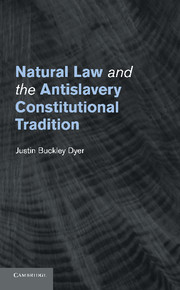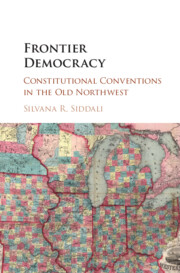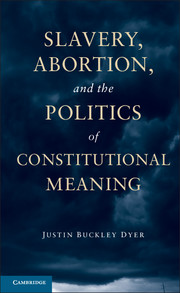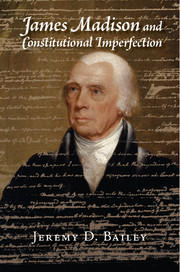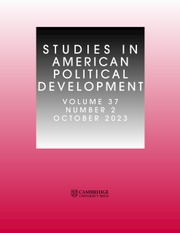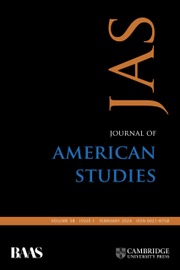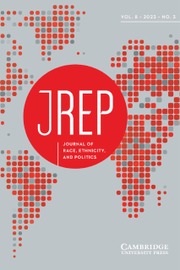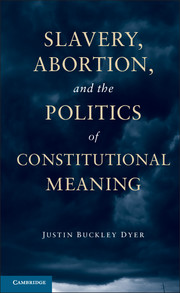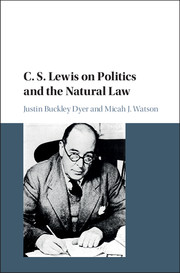Natural Law and the Antislavery Constitutional Tradition
£21.99
- Author: Justin Buckley Dyer, University of Missouri, Columbia
- Date Published: December 2014
- availability: Available
- format: Paperback
- isbn: 9781107454354
£
21.99
Paperback
Other available formats:
Hardback, eBook
Looking for an inspection copy?
This title is not currently available on inspection
-
In Natural Law and the Antislavery Constitutional Tradition, Justin Buckley Dyer provides a succinct account of the development of American antislavery constitutionalism in the years preceding the Civil War. Within the context of recent revisionist scholarship, Dyer argues that the theoretical foundations of American constitutionalism - which he identifies with principles of natural law - were antagonistic to slavery. Still, the continued existence of slavery in the nineteenth century created a tension between practice and principle. In a series of case studies, Dyer reconstructs the constitutional arguments of prominent antislavery thinkers such as John Quincy Adams, John McLean, Abraham Lincoln and Frederick Douglass, who collectively sought to overcome the legacy of slavery by emphasizing the natural law foundations of American constitutionalism. What emerges is a convoluted understanding of American constitutional development that challenges traditional narratives of linear progress while highlighting the centrality of natural law to America's greatest constitutional crisis.
Read more- Succinct account of the development of antislavery constitutionalism
- Lucid and engaging prose
- Combines normative and empirical analysis
- Written against the backdrop of recent revisionist scholarship
Reviews & endorsements
'In this provocative book, Justin Buckley Dyer makes a case for the US Constitution's natural law foundations. He does not divine the Constitution's meaning from the intent of the Founders or the understanding of the ratifiers, however. Rather, he argues that natural law informed constitutional thinking and that abolitionists who deployed natural law concepts in their subsequent reading of the Constitution were substantially right.' H. Robert Baker, The Journal of American History
See more reviews'Justin Buckley Dyer's heart seems to lie in theory, though his strongest contributions are historical … Dyer's first book is a worthwhile rejoinder to the prevailing trend of histories depicting the Constitution as neutral-at-best on slavery.' Aaron Keck, Political Theory
'Justin Buckley Dyer does a wonderful job highlighting how the Declaration of Independence in particular and natural law principles more generally inspired the antislavery movement in the United States. Natural Law and the Antislavery Constitutional Tradition boldly defends the Lincolnian proposition that 'the Constitution drew aspirational content from the [natural law] principles in the opening lines of the Declaration of Independence, 'and is the best extant account for how prominent antislavery activists employed those principles in their effort to place slavery on 'the course of ultimate extinction'. … The chapters on John Quincy Adams and Justice John McLean are particularly worth the price of admission.' Mark A. Graber, Tulsa Law Review
'If the purpose of Dyer's book is to serve as a resource on the foundations and meanings of American antislavery constitutional rhetoric, then this is a fine contribution to the literature. It makes compelling links between past thought and more recent legal philosophers. In particular, it sheds clear light on the natural-law thinking of celebrated judges and statesmen, like Mansfield, Adams, and Lincoln.' Dominic DeBrincat, H-Net Reviews
Customer reviews
Not yet reviewed
Be the first to review
Review was not posted due to profanity
×Product details
- Date Published: December 2014
- format: Paperback
- isbn: 9781107454354
- length: 208 pages
- dimensions: 218 x 140 x 13 mm
- weight: 0.29kg
- availability: Available
Table of Contents
1. Prologue: slavery and the laws and rights of nature
2. Introduction: the apple of gold
3. Somerset and the antislavery constitutional tradition
4. Constitutional disharmony in The Antelope and La Amistad
5. Constitutional construction in Prigg and Dred Scott
6. Natural law, providence, and Lincoln's constitutional statesmanship
7. Public reason and the wrong of slavery
8. Conclusion: the heritage of the antislavery constitutional tradition.
Sorry, this resource is locked
Please register or sign in to request access. If you are having problems accessing these resources please email lecturers@cambridge.org
Register Sign in» Proceed
You are now leaving the Cambridge University Press website. Your eBook purchase and download will be completed by our partner www.ebooks.com. Please see the permission section of the www.ebooks.com catalogue page for details of the print & copy limits on our eBooks.
Continue ×Are you sure you want to delete your account?
This cannot be undone.
Thank you for your feedback which will help us improve our service.
If you requested a response, we will make sure to get back to you shortly.
×
